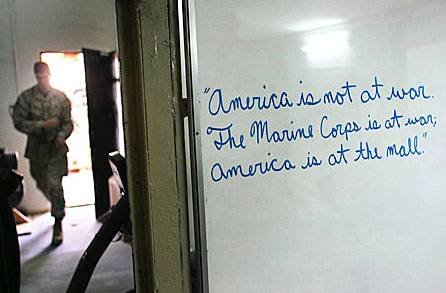The Captain Crisis
BY Herschel SmithThe Small Wars Journal Blog linked an International Herald Tribune article on the crisis of Captains in the Army.
During the war in Iraq, young army and Marine captains have become American viceroys, officers with large sectors to run and near-autonomy to do it. In military parlance, they are the “ground-owners.” In practice, they are power brokers.
“They give us a chunk of land and say, ‘Fix it,’ ” said Captain Rich Thompson, 36, who controls an area east of Baghdad.
The Iraqis have learned that these captains, many still in their 20s, can call down devastating American firepower one day and approve multimillion-dollar projects the next. Some have become celebrities in their sectors, men whose names are known even to children.
Many in the military believe that these captains are the linchpins in the American strategy for success in Iraq, but as the war continues into its sixth year the military has been losing them in large numbers — at a time when it says it needs thousands more.
Most of these captains have extensive combat experience and are regarded as the military’s future leaders. They’re exactly the men the military most wants. But corporate America wants them too. And the hardships of repeated tours are taking their toll, tilting them back toward civilian life and possibly complicating the future course of the war…
Max Boot has recently discussed what he calls The Iraq Recession Fallacy. The thrust of his main argument is not pertinent, but there is one important paragraph for our purposes.
The overall size of our economy is $13.1 trillion. So the Iraq War is costing us less than 1% of GDP (0.91% to be exact). Even if you add in the entire defense budget that still only gets us to roughly 4% of GDP—roughly half of what we spent on average during the Cold War, to say nothing of previous “hot” wars such as World War II (34.5% of GDP), Korea (11.7%), and Vietnam (8.9%).
The force size reduction began under Bush 41 and continued under two consecutive Clinton administrations. Rumsfeld believed his own press and ignored his generals, and went to war with half of the force size needed to secure Iraq. The breaking of the Army and Marines began almost two decades ago. To be successful in the global war, America must once again go on a war footing.

Back to the Captain crisis. These things are also true in the enlisted ranks, not only for recruitment goals but also for reenlistment. In addition to increased reenlistment bonuses, The Captain’s Journal has recommended an across the board 40% increase in salaries for all service members. America needs to increase the force size in order to put an end to continual re-deployments of the same units to the same theater, and make being in the armed forces more lucrative in order to grow the size of the force and retain qualified personnel.
There is another reason that the Captain crisis is important. Not only does the Army and Marines need combat experienced commanders, but it needs the same in the enlisted ranks down to the Lance Corporal and Corporal. America may soon be facing a situation in which the majority of her combat experienced warriors are doing civilian jobs and her active duty warriors are untested. Finally, in order to demand the greatest respect from the enlisted ranks, officers need to have the same combat experience of their reports.





On March 25, 2008 at 5:50 pm, Smitten Eagle said:
HS-
I’m not sure a 40% pay increase would help much. The problem rather lies at how soldiers & Marines are treated, not how they are paid.
Do we treat soldiers & Marines like they are Ends, rather than Means to an end. If we decide to treat them as Ends, we will be responsive to their desires for a dignified life. If you want to keep your officers, you will treat them well, as if they were Ends in themselves.
This implies that we take their desires for a decent family life seriously.
Smitten Eagle
On March 25, 2008 at 9:12 pm, MIMack said:
Although I would love to see the 40% raise, I would be far more thrilled with support from our government. And from our country. You are right on the mark. Even the last time I deployed a couple years ago, we had Lts doing Captain’s (and Major’s) jobs. Even the Marines had problems. I worked with Gunnys with less then 9 years, on their first tour. And although they were able, their lack of experience when coupled with officers without experience, led to some dicey situations. Our National Guard unit had more senior NCOs with more deployment experience then the unit we replaced, which was active Army. But we are not broken, nor do I see us breaking in the near future. The question is… Do we (the USA) want to win the war (on Terrorism) or not. If so, show it, and let us get it done.
On March 27, 2008 at 2:58 pm, GI said:
A 40% pay increase would be nice but I just don’t see it happening. Something the government could do is ensure that when deployed US troops are the highest paid though. Currently there are foreign nations paying their soldiers more in deployment pay then what US troops doing the actual hard dirty work in these war zones are making. US troops in my opinion should always be the highest paid soldiers in any war zone which right now isn’t the case.